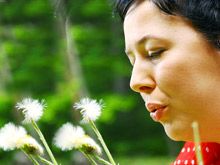Health Topics
-
Healthy Living
-
|
|
January 2010
|
| Winter Allergies |
| Dr Jyothsna |
| |
 |
Allergies – especially those related to breathing and the skin – are rampant as the winter temperature stays down Allergies are disorders of one's immune system. Though treatments to boost up the immune system like immunotherapy are available, some allergies stay with you for life. The best thing you can effectively do about it is to keep it under control by preventing them from reacting to otherwise harmless environmental substances.
|
Skin Allergies
Skin and foot care in winter is especially important if you have associated conditions like diabetes or peripheral vascular disease where blood supply to your lower limbs is compromised. Cuts and bruises need to be taken care of well, or they can progress to bad secondary infections, cellulitis or gangrene, if not treated promptly.
There are different types of skin allergies:
- Winter itch (asteatotic eczema) is a common condition which especially affects elderly people's legs, where they get itching and scaly lesions.
- When the skin comes in contact with an allergy causing substance and reacts to it, a regular allergy or atopic dermatitis results. This affects skins of any age – from infants to adults - with skin lesions ranging from mild patchy localised skin inflammation to frank eczema where the skin is characterised by redness, itching, and oozing vesicular lesions, becomes scaly, crusted, or hardened. This is associated with increased bacterial infections.
- Another allergy is coin shaped lesions over your legs which are terribly itchy, troublesome - and frequently flare up and regress. It is known as nummular eczema.
- Psoriasis is a chronic inflammatory skin disorder where you get dry, itchy abnormally red plaque like lesions over your body, scalp etc., with extensive scaling. The itchiness and scaling of these lesions are known to aggravate in winter mainly on account of excessive dryness of skin during this season.
- Though seborrhea translates as 'too much oil,' this skin condition has little to do with having too much oil on the skin. Seborrheic dermatitis usually expresses itself as dandruff on the scalp and the skin looks dry or red. These conditions worsen in harsh winter conditions due to excessive dryness of skin.
- Winter also brings about cracked soles, which are extremely painful. These are associated with secondary (either bacterial or fungal) infections which worsen with the onset of winter.
Respiratory Allergies
Sinusitis, rhinitis and tonsillopharyngitis are more common during winter. Children and elderly people should receive prompt attention and treatment of these common conditions. This could prevent further aggravation to forms of lower respiratory tract infections like bronchitis or pneumonia. Most of these infections are either viral or bacterial and are treated with decongestants, occasional requirement of antibiotics and use of non pharmacological measures like steam inhalation/warm fluid hydration etc.
3 Winter Skin Care Resolutions
- Excessive dryness of the skin is what mainly causes skin allergies during winter, and hence preventive measures revolve around controlling that.
- Use skin moisturising creams regularly. These skin creams may be applied liberally over the affected area immediately after a bath and work best when applied when the skin is still a little moist.
- Don't use harsh soaps that dry up your skin. Select ones with a neutral pH.
If your doctor prescribes you medications for your particular condition, do take them regularly without fail. |
Patients with chronic respiratory problems like asthma and COPD have a difficult course in winter because of the sudden dip in late night and early morning temperatures and the frequent associated infections. Worsening of these conditions are generally avoidable with regular use of inhaled therapy and even increasing doses for symptomatic prevention of infections, prompt treatment of minor infections, use of warm clothing and other such measures.
Pampering your skin well, looking after medical conditions affecting skin and respiratory conditions would help in getting through a difficult winter with the least number of complications. Let us see the cold days out – and be back for the happy ones. Happy New Year! |
|
 |
Dr. Jyothsna is Consultant, Internal medicine at Apollo Hospitals, Bangalore
|
|
|